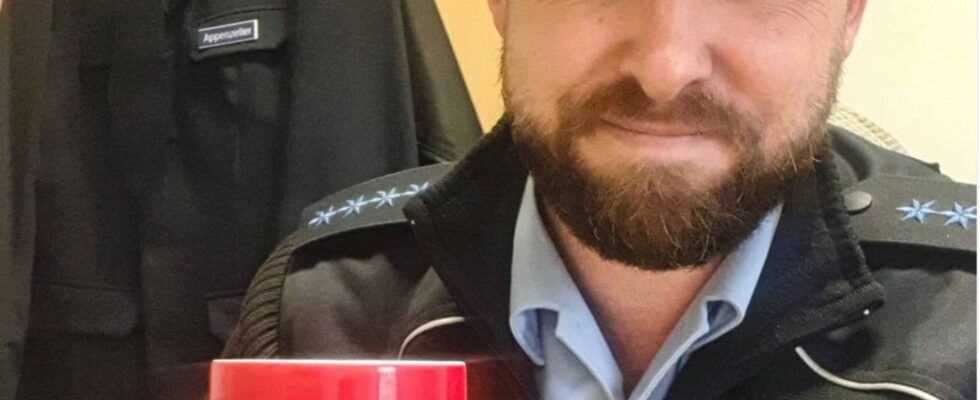May 17th – Day Against Homophobia
“According to the study, 90 percent of crimes against queer people go unreported”
© instagram / gaygermancop
“Gaygermancop” (gay German police officer) – this is the name under which you can find Wolfgang Appenzeller on Instagram. He openly shows the flag – that of the rainbow. In an interview, he reveals why visibility is important to the police.
When Wolfgang Appenzeller came to the Federal Police in 1994, he was given a thick folder with loose legal texts. Whenever something changed in the criminal law, there was an additional delivery with new or deleted paragraphs that the trainees had to put in or out of their files. Wolfgang Appenzeller was 20 and had just started his training when a new delivery arrived. A paragraph had to be deleted from the criminal law, it said. When Wolfgang Appenzeller took the sheet of paper out of the folder and read the text of the law, he felt a cold spine. He was holding paragraph 175 in his hands.
It is the paragraph that made sexual acts between persons of the male sex a criminal offense until 1994. It was a shock for Wolfgang Appenzeller. He hadn’t realized that until recently, his colleagues were still charged with prosecuting homosexual acts. In the next few days one thought persisted: Can and do I want to stay with the police?
26 years later we meet him – even if only virtually via video call – in his office. He wears a uniform. The rainbow flag is pinned on the wall behind him. At that time, Wolfgang Appenzeller decided to stay with the police. Today he is the chief police officer, employee of the equal opportunities officer and contact person for lesbians, gays, bisexuals, transgender and intersex people.
Mr. Appenzeller, how did you come out of the police force at the time?
Wolfgang Appenzeller: It happened very coincidentally. I was sitting with a colleague in the training center. She asked me why I was in such a good mood today and why I was grinning over my head. At that point in time I hadn’t decided to come out in my job. So I said flatly, I met someone there. Suddenly she asked what his name was. At first I thought I had misheard. When I think about it, I still feel cold.
How did you react?
I felt caught out. There were a thousand different voices in my head. Meanwhile, I just slipped out: “His name is Stephan!”. She was happy for me. Then word got around very quickly. I personally thought that was okay at the time. That saved me a lot of conversations.
Is there anything you would like to know before you come out?
Back then I felt like the colorful and only gay one. Now I know that of course I wasn’t. It is believed that around 10 percent of our society is queer. If you put that on the federal police, there could be an estimated 5000 LGBTQIA + police officers inside. It is almost impossible to be the only queer cop in your field of work: in. At that time I would have wanted to know other colleagues like me and to have role models. That’s why visibility is so important to me.
Is that also the reason why you are so open about your sexuality on your Instagram channel “gaygermancop”?
Exactly, I want to ensure visibility within the police. In addition, social media also give me the opportunity to represent myself outside of the LGBTQIA + community. I want to break down prejudices and show that we stand up for queer people and that we also work with gay, lesbian, bi and trans police officers: police in the community and community in the police, so to speak.
They also showed their presence at the Christopher Street Day in Munich with an information booth. How did that go down?
There were people who fell around your neck with tears in their eyes. I particularly remember a man who came to the information booth with his lesbian daughter. When I introduced him to my queer colleagues, he cried for joy. I get goose bumps now!
A great moment that would have been unthinkable a few years ago. Have the police reached their goal when it comes to tolerance?
It depends who you ask. Some say that is going too far. Others say it doesn’t go far enough. Ultimately, the police are there to maintain public safety and order. It is important that people from the LGBTQIA + community have the courage to file a complaint. From a study by “European Union Agency for Fundameltal Rights“It emerged in 2020 that in Germany 81% of the cases of hate-motivated physical or sexual assaults against lesbian, gay and trans people are not reported. In the case of harassment or insult, the victims even do not report the act in 91% of the cases. The thought that the police were the evil persecutors back then, is probably still deeply anchored in the collective memory of the LGBTQIA + community. I want queer people to know that they can come to us. We help, no matter who – that’s our job!
Sources used: interview

